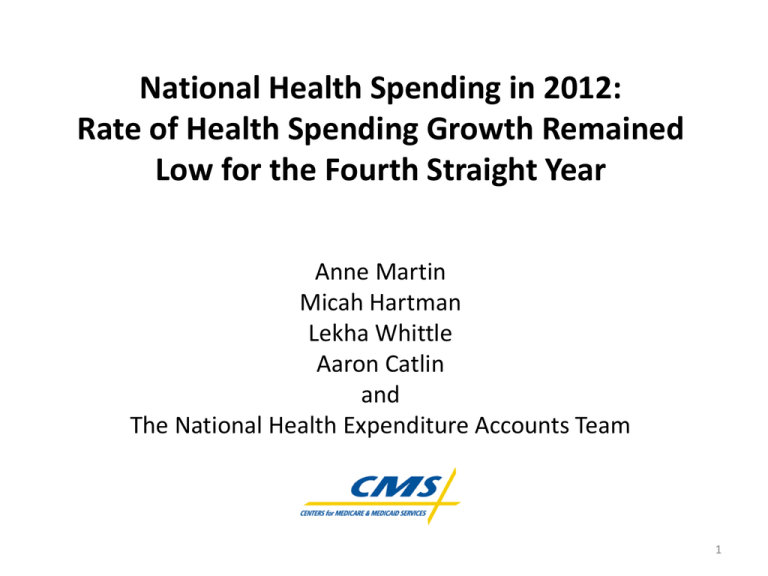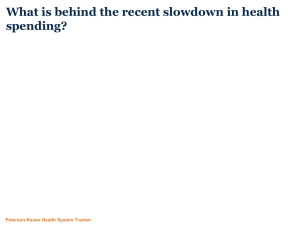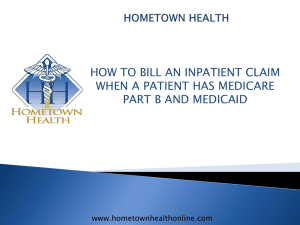
National Health Spending in 2012:
Rate of Health Spending Growth Remained
Low for the Fourth Straight Year
Anne Martin
Micah Hartman
Lekha Whittle
Aaron Catlin
and
The National Health Expenditure Accounts Team
1
2012 National Health Expenditure Accounts
National health spending increased 3.7 percent in 2012
following 3.6 percent growth in 2011.
National health spending reached $2.8 trillion, or $8,915 per
person in 2012.
The share of Gross Domestic Product (GDP) devoted to health
care spending fell slightly—from *17.3 percent in 2011 to 17.2
percent in 2012.
*The 2011 health share of GDP was revised due to a large upward revision to GDP
SOURCE: Centers for Medicare & Medicaid Services, Office of the Actuary, National Health Statistics Group.
2
Growth in National Health Expenditures (NHE) and
Gross Domestic Product (GDP), and NHE as a Share of GDP, 1990-2012
NHE
20.0
16.0
NHE as a share of GDP
March 2001November 2001
Recession
July 1990March 1991
Recession
18.0
GDP
14.0
Percent
12.0
17.4 17.4 17.3 17.2
14.9
12.1
13.4 13.3 13.4 13.4 13.3 13.3 13.3 13.4
12.8 13.1
15.9
15.4 15.5 15.5 15.6
16.4
December
2007- June
2009
Recession
14.1
10.0
8.0
6.0
4.0
2.0
-
Calendar Years
SOURCES: Centers for Medicare and Medicaid Services, Office of the Actuary, National Health Statistics Group; Department
of Commerce, Bureau of Economic Analysis and National Bureau of Economic Research.
2012
2011
2010
2009
2008
2007
2006
2005
2004
2003
2002
2001
2000
1999
1998
1997
1996
1995
1994
1993
1992
1991
(4.0)
1990
(2.0)
2012 National Health Expenditure Accounts
Overall Mixed Trends
Faster growth in personal health care (PHC) spending
Slower growth in investment and the net cost of private
health insurance; decline in non-commercial research
SOURCE: Centers for Medicare & Medicaid Services, Office of the Actuary, National Health Statistics Group.
4
2012 National Health Expenditure Accounts
Price vs. Non-Price Trends
Price growth accounted for a smaller portion of health
spending increase in 2012 compared to 2011.
Non-price factors accounted for a larger portion of health
spending increase in 2012 compared to 2011.
Population growth
Age & gender shifts
Other, such as use & intensity of health care goods and services
SOURCE: Centers for Medicare & Medicaid Services, Office of the Actuary, National Health Statistics Group.
5
Factors Accounting for Growth in Per Capita National
Health Expenditures and Personal Health Care
Expenditures, Calendar Years 2008-2012
Other nonprice factors
Age and sex factors
Medical prices
Per capita spending growth
Percent
6.5%
6.0%
5.5%
5.0%
4.5%
4.0%
3.5%
3.0%
2.5%
2.0%
1.5%
1.0%
0.5%
0.0%
-0.5%
2008
2009
2010
2011
National health expenditures
2012
2008
2009
2010
2011
2012
Personal health care expenditures
SOURCE Centers for Medicare and Medicaid Services, Office of the Actuary, National Health Statistics Group. NOTES Medical price growth, which includes
economywide and excess medical-specific price growth (or changes in medical-specific prices in excess of economywide inflation), is calculated using the
chain-weighted national health expenditures (NHE) deflator for NHE and the chain-weighted personal health care (PHC) deflator for PHC expenditures.
As a residual, the category of other nonprice factors includes use and intensity and any errors in measuring prices or total spending.
6
2012 National Health Expenditure Accounts
Trends by Services in 2012
Spending increased at a faster rate:
• Hospital care
• Physician and clinical services
Spending increased at a slower rate:
• Retail prescription drugs
• Nursing care facilities
SOURCE: Centers for Medicare & Medicaid Services, Office of the Actuary, National Health Statistics Group.
7
2012 National Health Expenditure Accounts
Trends by Payers in 2012
Spending increased at a faster rate:
• Medicaid
• Out-of-pocket spending
Spending increased at a slower rate:
• Private health insurance
• Medicare
SOURCE: Centers for Medicare & Medicaid Services, Office of the Actuary, National Health Statistics Group.
8
Affordable Care Act
Overall, Affordable Care Act provisions effective for 2010
through 2012 had minimal impact on total national health
spending.
Sector-specific provisions:
Private health insurance
• Pre-existing condition insurance program
• Early retiree reinsurance program
• Coverage for dependents under age 26
• Minimum medical loss ratio
Medicare Program
• Reduced payment updates (productivity adjustments)
Retail Prescription Drugs
• Medicare drug coverage gap discount program
• Medicaid retail prescription drug rebates
SOURCE: Centers for Medicare & Medicaid Services, Office of the Actuary, National Health Statistics Group.
9
The Nation’s Health Dollar ($2.8 Trillion),
Calendar Year 2012: Where It Went
Dental Services and
Other Professionals
7%
Prescription
Drugs
9%
Government
Administration and Net
Cost of Health Insurance
7%
Investment1
6%
Physicians and Clinics
20%
Hospital Care
32%
Other
14%
Nursing Care Facilities
and Continuing Care
Retirement Communities
5%
Other Medical Products2
3%
Government
Public Health
Activities
Home
3%
Health
Care
3%
Other Health,
Residential, and Personal
Care3
5%
1
Includes Research (2%) and Structures and Equipment (4%).
Durable (1%) and Non-durable (2%) goods.
3 Includes expenditures for residential care facilities, ambulance providers, medical care delivered in non-traditional
settings (such as community centers, senior citizens centers, schools, and military field stations), and expenditures
for Home and Community-based Waiver programs under Medicaid.
Note: Sum of pieces may not equal 100% due to rounding.
2 Includes
SOURCE: Centers for Medicare & Medicaid Services, Office of the Actuary, National Health Statistics Group.
10
Annual Growth in Spending by Type of Service,
2011 and 2012
3.6
3.7
3.5
National Health Expenditures
Hospital Care
4.9
4.1
Physician And Clinical Services
2.2
Dental Services
4.6
3.0
4.6
4.5
Other Professional Services
3.3
Other Health Residential And Personal Care
4.5
4.1
Home Health Care
Nursing Care Facilities And Continuing Care Retirement
Communities
4.3
1.6
Prescription Drugs
5.1
2.5
0.4
Other Non-Durable Medical Products
3.0
1.8
5.6
5.6
5.7
Durable Medical Equipment
Investment
1.4
0.0
1.0
2.0
2011
3.0
4.0
5.0
2012
SOURCE: Centers for Medicare & Medicaid Services, Office of the Actuary, National Health Statistics Group.
6.0
32%
7.0
Annual Growth in Hospital Spending,
2008 - 2012
6.6
• Total spending=$882.3 billion
6.0
5.3
4.9
5.0
4.6
4.0
3.5
• Spending increased 4.9%
• Faster growth in 2012 driven by:
– Private Health Insurance
– Medicare
– Medicaid
3.0
2.0
1.0
0.0
2008
2009
2010
2011
2012
SOURCE: Centers for Medicare & Medicaid Services, Office of the Actuary, National Health Statistics Group.
12
20%
Annual Growth in Physician and Clinical
Services Spending, 2008 - 2012
6.0
5.3
5.0
4.6
4.1
4.0
3.4
3.1
3.0
•
•
•
Total spending=$565.0 billion
Spending increased 4.6%
Faster growth in 2012 driven by:
– Use & intensity of services
– Out-of-pocket spending
– Private Health Insurance
2.0
1.0
0.0
2008
2009
2010
2011
2012
SOURCE: Centers for Medicare & Medicaid Services, Office of the Actuary, National Health Statistics Group.
13
9%
Annual Growth in Retail Prescription Drug
Spending, 2008- 2012
6.0
•
•
•
4.9
5.0
4.0
3.0
2.5
2.8
2.0
1.0
0.4
0.4
0.0
2008
2009
2010
Total spending=$263.3 billion
Spending increased 0.4%
Slower growth in 2012 driven by:
– Slow growth in prices
• Patent expirations
– Increased Generic
Dispensing Rate
– Decline in out-of-pocket
spending
– Decline in Private Health
Insurance spending
2011
2012
SOURCE: Centers for Medicare & Medicaid Services, Office of the Actuary, National Health Statistics Group.
14
The Nation’s Health Dollar ($2.8 trillion),
Calendar Year 2012: Where It Came From
Government
Public Health
Investment
Activities
Other Third
6%
3%
Party Payers
and
Programs1
8%
Medicaid
(Title XIX)
State and
Local 7%
Out-ofpocket2
12%
Health
Insurance
72%
VA, DOD,
and CHIP
(Titles XIX
and Title
XXI)
4%
Medicaid
(Title XIX)
Federal
9%
Medicare
20%
Private
Health
Insurance
33%
Health Insurance
1 Includes
worksite health care, other private revenues, Indian Health Service, workers’ compensation, general
assistance, maternal and child health, vocational rehabilitation, Substance Abuse and Mental Health Services
Administration, school health, and other federal and state local programs.
2 Includes co-payments, deductibles, and any amounts not covered by health insurance.
Note: Sum of pieces may not equal 100% due to rounding.
SOURCE: Centers for Medicare & Medicaid Services, Office of the Actuary, National Health Statistics Group.
15
Annual Growth in Spending by Source of Funds,
2011 and 2012
National Health Expenditures
3.6
3.7
Out of pocket
3.5
3.8
3.4
3.2
Private Health Insurance
5.0
4.8
Medicare
2.4
Medicaid (Title XIX)
3.3
3.8
CHIP (Title XIX and Title XXI)
Department of Veterans Affairs
5.3
6.1
3.6
3.8
Department of Defense
1.7
3.7
Other Third Party Payers and Programs
6.8
0.0
2011
2.0
4.0
6.0
2012
SOURCE: Centers for Medicare & Medicaid Services, Office of the Actuary, National Health Statistics Group.
8.0
33%
Private Health Insurance: Growth in Enrollment,
Premiums, and Benefits, 2008 – 2012
Total PHI: Growth in Enrollment,
Premiums, and Benefits
•
•
•
•
10%
9%
8%
7%
6%
5%
4%
4.9%
4.3%
3.9%
3.1%
3.4%
3.2%
3%
3.6%
3.2%
3.4%
2.3%
Total Spending = $917.0 billion
Spending increased 3.2%
Enrollment reached 188 million
Slightly slower premium growth
in 2012 driven by:
– Increased enrollment in
high-deductible plans
– Lower growth in the net
cost of insurance
2%
0.5%
1%
0.4%
0%
-1%
-2%
-0.8%
2008
2009
-3%
-4%
2010
-1.8%
2011
2012
-3.2%
PHI Enrollment
Premiums
Benefits
SOURCE: Centers for Medicare & Medicaid Services, Office of the Actuary, National Health Statistics Group.
17
33%
Private Health Insurance: Growth in Per Enrollee,
Premiums, and Benefits, 2008 – 2012
•
Per Enrollee: Growth in Premiums
and Benefits
•
10%
9%
8%
7%
6%
5%
4%
3%
2%
1%
0%
•
7.7%
6.5%
5.7%
4.7%
2008
5.1%
4.2%
2.9%
2.8%
2009
2010
2011
3.2%
2.7%
2012
Premium and medical benefit per
enrollee trend remained low
Relatively flat premium per
enrollee trend
Medical benefit spending per
enrollee trend:
– Slightly faster due to an
acceleration in spending for
hospital care and physician
and clinical services
– Partially offset by a decline in
retail prescription drug
spending
Premiums per enrollee
Benefits per enrollee
SOURCE: Centers for Medicare & Medicaid Services, Office of the Actuary, National Health Statistics Group.
18
20%
Medicare: Growth in Total Expenditures and
Enrollment, 2008 – 2012
10%
9%
8.1%
8%
6.8%
7%
6%
5.4%
5.0%
5%
4.3%
4.8%
• Total Spending = $572.5 billion
• Spending increased 4.8%
• Slightly slower growth in 2012
was driven primarily by a
decline in Nursing Home Care
spending
4.1%
4.1%
4%
3%
2.6%
2.4%
2.5%
1.6%
2%
2.5%
2.5%
0.7%
1%
0%
2008
2009
Medicare Enrollment
2010
2011
Medicare Spending
2012
Per enrollee
SOURCE: Centers for Medicare & Medicaid Services, Office of the Actuary, National Health Statistics Group.
19
20%
Medicare: Growth in FFS and Medicare Advantage
Expenditures and Enrollment, 2008 – 2012
Fee-for-Service
Medicare Advantage
25%
25%
21.1%
20%
20%
15%
15%
15.7%
15.0%
10.9%
10.5%
10%
10.0%
10%
7.0%
5%
5.1%
5.3%
4.7%
4.2%
4.0%
0%
0.2%
4.3%
3.9%
2.4%
1.5%
5%
2.7%
2.1%
1.5%
2009
2010
2011
0.6%
5.4%
1.6%
0.8%
-1.0%
0%
2012
-5%
FFS Enrollment
4.6%
2.7%
-0.4%
2008
4.7%
5.6%
2008
2009
2010
2011
2012
-5%
FFS Spending
Per FFS enrollee
MA Enrollment
MA Spending
Per MA enrollee
SOURCE: Centers for Medicare & Medicaid Services, Office of the Actuary, National Health Statistics Group.
20
15%
Medicaid: Growth in Total Expenditures and
Enrollment, 2008 – 2012
Total Medicaid Expenditures and
Enrollment
10%
8.8%
8%
7.3%
6%
4%
6.1%
5.8%
4.9%
3.5%
2.2%
2.4%
1.4%
2%
3.3%
3.2%
1.9%
1.1%
1.3%
-0.7%
0%
-2%
2008
2009
Enrollment
2010
Spending
2011
2012
• Total Spending = $421.2 billion
• Spending increased 3.3%
• Slightly faster growth in 2012
driven by increased spending
growth for:
–Hospital care
–Other health, residential, and
personal care
• Spending growth in 2011 and
2012 historically low (excluding
2006) due to:
–Slowdown in enrollment
growth
–States efforts to control costs
Per enrollee
SOURCE: Centers for Medicare & Medicaid Services, Office of the Actuary, National Health Statistics Group.
21
15%
Medicaid: Growth in Total, Federal, and State &
Local Expenditures,
2008 – 2012
Federal and State & Local
Medicaid Expenditures
22.0%
21.9%
15.0%
9.6%
8.8%
7.8%
6.1%
5.8%
2.7%
0.7%
2.4%
3.3%
-4.2%
-7.2%
-10.0%
2008
2009
Total
2010
Federal
2011
2012
State/local
SOURCE: Centers for Medicare & Medicaid Services, Office of the Actuary, National Health Statistics Group.
22
Distribution and Annual Growth
by Type of Sponsor
Distribution of National Health
Expenditures by Type Of Sponsor,
2010 - 2012
20%
100%
90%
16%
17%
18%
State and local
government
28%
27%
26%
Federal
government
80%
70%
60%
50%
40%
30%
15%
10%
5%
7%
28%
7%
28%
7%
28%
Other Private
Revenues
Households
0%
-5%
2008
20%
10%
Annual Growth in Spending by
Sponsor, 2008 - 2012
20%
21%
21%
2010
2011
2012
Private Business
0%
2009
2010
2011
2012
State and Local Government
Federal Government
Private Business
Households
Note: Sum of pieces may not equal 100% due to rounding.
SOURCE: Centers for Medicare & Medicaid Services, Office of the Actuary, National Health Statistics Group.
23
2012 National Health Expenditure Accounts:
Summary
National Health Expenditures increased 3.7 percent in 2012.
National Health Expenditures reached $2.8 trillion, or $8,915 per person in 2012.
National Health Expenditures represented a 17.2 percent share of Gross Domestic Product
(GDP).
Spending grew faster in 2012 for:
• Hospitals
• Physician and clinical services
• Medicaid
• Out-of-pocket
Spending grew at a slower rate in 2012 for:
• Prescription drugs
• Nursing care facilities
• Private health insurance
• Medicare
Sponsor
• Shares have remained stable except for the end of the temporary shift from federal to
state and local
SOURCE: Centers for Medicare & Medicaid Services, Office of the Actuary, National Health Statistics Group.
24







